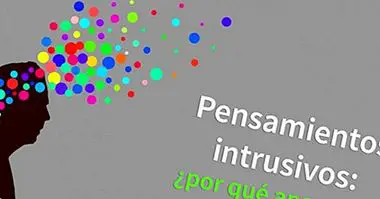This is the fear of not having control (of oneself or of relationships)
Within our nature as human beings, we find the need to feel that we have our life under control . This feeling helps us to feel safe and promotes psychological well-being.
However, when this need for control becomes an emergency or an essential condition for our peace of mind, it can cause havoc both in our personal relationships, in our work life and in the quality of life in general.
- Related article: "Albert Bandura's self-efficacy: do you believe in yourself?"
What is meant by the need to have control?
To be able to know what a person with fear of not having control First we must know what is the need for control and what psychological implications it has.
By "need for control" we understand the need of the person to understand what surrounds him in order to exert an effect or power over it. As well as the urgency it feels to determine a series of results or consequences before they occur.
In cases where this feeling of control it is threatened well by chance Because the situation does not depend on the person or because there are others who make the decisions, it is possible that the person experiences a series of negative emotions such as frustration and anger, which force him to carry out domination, extortion or criticism.
In these cases, a mechanism known as "control motivation" is set in motion. Driven by the motivation of control, the person can react in two different ways: on the one hand, a psychological reactance may appear, through which the person still makes greater efforts to try to control an uncontrollable situation; or it can be generated a feeling of helplessness in which the attempts to dominate disappear.
Although generally the tendency to plan things or prepare them in advance are considered as positive and really effective for the achievement of our objectives, when this trend is taken to the extreme and becomes a necessity it can interfere in our daily life.
- Related article: "Learned helplessness: delving into the psychology of the victim"
What is the cause of this fear?
The excessive need for control is usually caused by the fear of not having it. Although the exact causes of this fear of not being in control have not yet been determined, there are some theories that relate it to the personality or to the experience of traumatic events in the past.
One of these theories hypothesizes that in many cases, under the fear of not having control over the situation, an irrational fear of being at the mercy of other people . The cause of this fear at the idea of depending on others may have its origin in traumatic events in which the person felt helpless or vulnerable.
Past experiences of abuse, neglect or neglect may favor the person seeking, disproportionately, to regain the feeling that everything in his life is under control.
However, there are several factors that can play an important role in influencing the need for control of the person, favoring that it is accentuated in an excessive way. These factors are:
- Traumatic life experiences or of abuse.
- Lack of trust.
- Anxiety .
- Fear of abandonment.
- Low self-esteem.
- Beliefs and values of the person.
- Perfectionism .
- Fear to fail.
- Fear of experiencing negative or painful emotions.
How are people with high need for control?
Although at first glance people with fear of losing control of their lives, or who simply have the constant need to feel they have it, tend to look strong and confident; the reality is that behind this appearance there is a certain fragility, as well as a great vulnerability to the idea or fear that there are certain things that can not be controlled , that happen regardless of what you want.
People with a tendency to control everything around them experience great fear of the appearance of sudden and unexpected events, since their ability to be spontaneous or improvise is not well developed.
In addition, another characteristic that defines these people is the feeling that the rest depend on your ability to manage the events that happen on a day-to-day basis . So this feeling of responsibility can become a powerful stressor.
What types of control exist?
There are innumerable ways in which people can try to take control of their environment as well as other people. These people exercise a kind of dominance in their intimate relationships, in the family, work or social environment .
1. Need for control over oneself
When the person experiences an excessive fear of not having control of his life , can carry out the following behaviors:
- Compulsive exercise
- Cleaning or compulsive cleanliness.
- Self-injury
- Substance abuse .
2. Need for control over others
Some examples of behaviors that these people exercise are:
- Control of the couple's activities .
- Review of personal items such as someone else's phone or social networks.
- Prevent another person from talking or relating to family or friends.
- Gaslighting.
- Dishonest conduct with third parties.
- Overprotective paternity.
- Physical abuse , sexual or emotional.
- Behaviors of intimidation or ridicule.
How can psychotherapy help?
Addressing the problems of control from psychotherapy involves discovering to the person the existence of a great need for control in it. This point is extremely complicated, since in most cases the patient is not able to perceive this need for dominance or power .
During therapy, the patient and the psychologist work together in order to address the underlying fear of this need. As well as the emotions associated with it, such as anxiety, creating a series of useful coping strategies when they appear.
This process in which the patient's self-consciousness is worked can help the patient to give up the need for control.
Cognitive psychotherapy can help the person identify the true cause of the need for control: self-protection. Emotional instability and lack of options or autonomy They can lead a person to seek control over other aspects of life. Recognizing and addressing this source of discomfort will help you develop self-pity and accept that part of the self that needs protection.



















